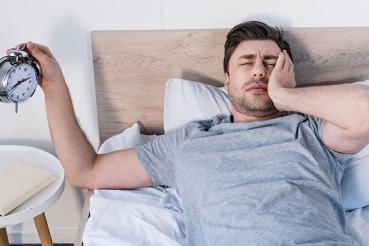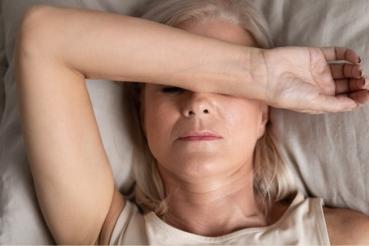There’s a song in the famous movie White Christmas where Bing Crosby croons, “When you’re worried and you can’t sleep, just count your blessings instead of sheep.”
While that’s not exactly the antidote for most sleep problems, Bing might’ve been on to something.
The COVID-19 pandemic has undoubtedly caused a lot of worry —about health, work, financial security, loved ones and the future in general. This, combined with a drastic change of routine, has driven countless people into poor sleep habits and sleepless nights.
Combating the ‘what if?’
“There are benefits to worrying,” says Rush clinical psychologist Sheila Dowd, PhD. “In fact, we’re taught that we should worry — that it protects us and helps us prepare if something goes wrong. In the case of COVID-19, however, there is a tremendous amount of uncertainty, so we could spend a lot of time worrying when there are no clear solutions to be found.”
Right now, uncertainty is causing a lot of “what if-ing” and overthinking: What if I lose my job? What if I get sick? What if I can’t get refills for my medications? This process creates a cycle of worrying about how we’ll resolve and cope with each outcome. Unfortunately, many people can spend an entire day trapped in this cycle.
“The most effective coping strategies involve finding some level of acceptance of our frustrations, including our inability to control much of what’s happening,” says Dowd. “Realizing that worrying won’t bring us clarity right now is a helpful revelation, especially when we’re worrying before bedtime.”
Dowd offers the following advice to help you wind down your emotions at the end of the day and transition into sleep mode — so you can get the rest you need to stay healthy.
Create a sense of calm
One exercise that limits anxiety and stress before going to sleep: writing down all the things you’re worried about, and then writing out what all the next steps are to each cause of stress.
“If you can think about that ‘next step,’ it will quiet the worry before you go to sleep, and a quiet brain before bed makes more a more restful night’s sleep,” says Dowd.
You can also try one of the apps that help achieve calmness through guided meditations and sleep sounds, like Insight Timer, a free app for sleep, stress and anxiety; Headspace, now offering a free two-week trial; and Calm, currently offering a free one-week trial.
Reduce your news consumption
There’s a lot of information being thrown at us daily, whether it’s which type of mask to wear, how to safely grocery shop or the number of new COVID-19 cases in our communities. Simplifying information intake can create less anxiety around our daily decisions.
“Limit your news sources and stick to a plan,” says Dowd. “Everybody has different opinions, and we can constantly worry about doing the right thing. Build a solid routine based on one reliable source of information. It may not be perfect, but it will create far less worry in your day.”
She also recommends disconnecting from your devices — especially the news or social media — an hour before bedtime. This will enable you to begin transitioning into sleep.
Return to the sleep routine that you had before sheltering in place, or create a new consistent COVID-19 sleep routine.
Don’t use your bedroom as a living room
With most people quarantined at home, the bed has now become associated with more than just sleep — whether it’s doubling as a workspace or a place to watch TV.
“Avoid working, hanging out or eating meals in bed,” says Dowd. “Keep that space calm, quiet and sacred so you don’t create any more distractions that can keep you from resting.”
If possible, put your phone, tablet or laptop in another room before you go to bed. That way, you won’t be tempted to reach for them if you can’t fall asleep or wake up in the middle of the night.
Stick to a sleep routine
Stress and anxiety can easily interrupt sleep patterns. What’s more, taking naps, drinking caffeine or alcohol, or waking up at different times each morning can all affect our ability to fall asleep at night, creating a cycle of inconsistent rest.
“If you’re having trouble sleeping, either return to the sleep routine that you had before sheltering in place, or create a new consistent COVID-19 sleep routine,” says Dowd. “Waking up at the same time every day, even on weekends, is a great start.”
Count your blessings
Getting back to Bing Crosby’s sage advice, if your worries are keeping you awake, try making a mental list of the things you’re grateful for. Focusing on the positives in your life may help you feel more at peace and remind you of everything you have to look forward to once the crisis is over.




